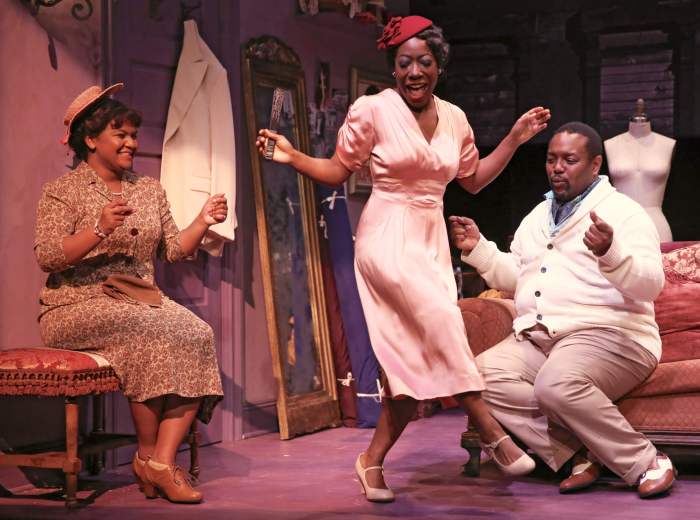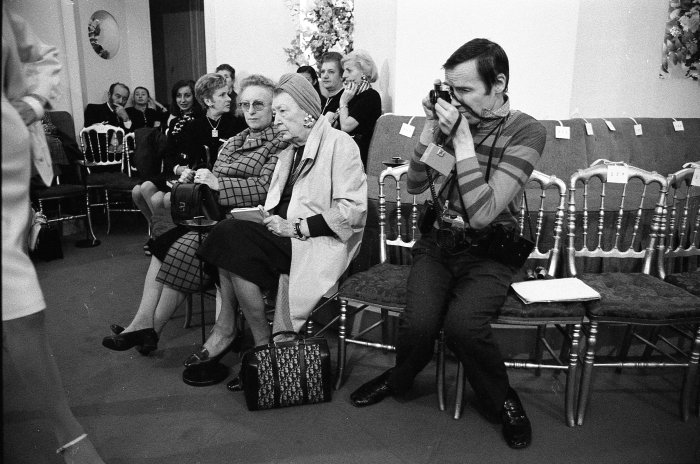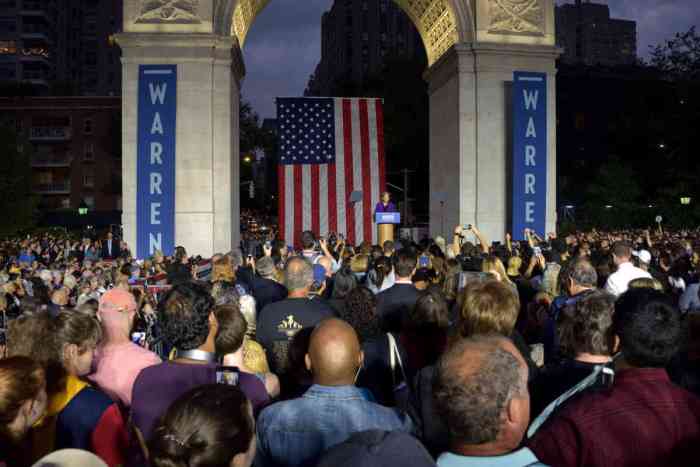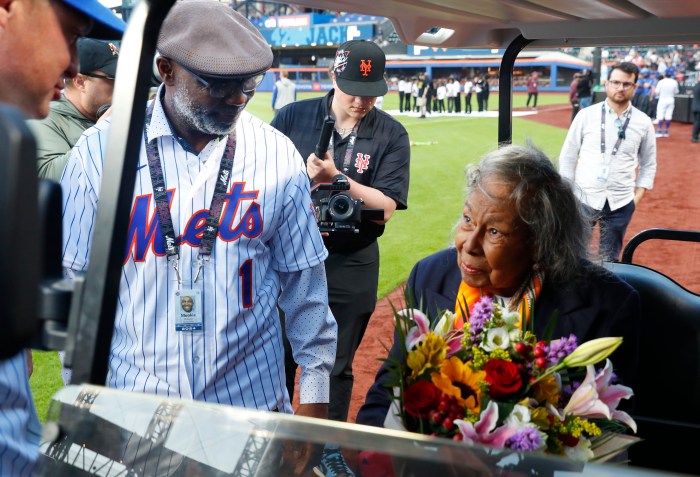Kyle Riabko and Laura Dreyfuss in “What’s It All About? Bacharach Reimagined.” | JOAN MARCUS
I never could much abide the songs of Burt Bacharach. They’ve always evoked soporific television variety shows from my youth not to mention my parents’ easy listening phase. “Promises Promises,” particularly in the recent revival, left me cold.
So, imagine my surprise at discovering the absolutely revelatory revue “What’s It All About: Bacharach Reimagined” at New York Theatre Workshop. A young genius by the name of Kyle Riabko has created new arrangements for many of the songs, put them together in a stunning playlist, added just the right amount of thteatricality, and come up with a not-to-be-missed show.
Amanda Peet’s unoriginal new play is worth skipping while a Burt Bacharach revue must be seen
Riabko takes these songs very seriously and looks into the heart of each of them, using harmonies and settings from cool jazz to rock, folk, and emo that are so arresting it’s like hearing these songs for the first time. Suddenly the lyrics by Hal David and others make emotional sense in a way they never did before. And, perhaps because my heart and ears were opened, I appreciated a sophistication I was unwilling to hear before.
Riabko has orchestrated the pieces to flow together with an amazing fluidity, picking out themes to weave throughout the evening, demonstrating a musicality that’s only too rare in this kind of undertaking.
In addition to Riabko, the other six members of the company each get their moments to shine, and they are all seriously accomplished musicians. Laura Dreyfuss and Nathaly Lopez stand out, in particular, in making overly familiar tunes seem fresh and exciting.
The show has just been extended until February 2. Do yourself a favor and go find out what it’s all about.
Blythe Danner and Nilaja Sun in Amanda Peet’s “The Commons of Pensacola.” | JOAN MARCUS
On December 31, 1980, during a performance of “The Philadelphia Story” at Lincoln Center, the microphones went out, amid a great deal of electronic noise. Blythe Danner, who was playing Tracy Lord, walked to the front of the stage, looked up at the booth, and said, “Turn the damn things off. We are professional actors. We are trained to project.” This was, as such breaking the fourth wall moments usually are, met with riotous approval by the New Year’s Eve audience. I bring this up because more than three decades later, Danner seems to have forgotten that training and can be seen virtually mumbling her way through “The Commons of Pensacola,” a new play by actress Amanda Peet now at MTC. Perhaps this is savvy self-preservation on Danner’s part, however, since there’s not much worth hearing in the play to begin with.
Danner is playing Judith, the wife of a once high-flying, now jailed financier living in relative seclusion in a generic retirement community in Pensacola. It is Thanksgiving and, stripped of all her known assets, which have gone to the victims of her husband’s perfidy, she is trying to get by on what’s left to her. Her younger daughter, Becca, a failing actress from LA, comes to visit, new boyfriend Gabe in tow. Becca’s visit is not just to console mom in her banishment; she is trying to revive her career by producing a kind of reality show about her mother with Gabe’s assistance. Judith and Gabe take an instant dislike to each another. It also turns out Judith may just have stashed away enough cash to live on comfortably for the rest of her life. Becca’s sister Ali shows up, and there is a sibling battle as well as a moral quandary about who knows what when and why and what they’re going to do about it lest they all be charged with crimes. All I could think was, “Who cares?”
The plotting is almost exclusively expository, and Peet has no ear for realistic dialogue. There is not much logic in the storytelling, and the characters lack any depth or subtlety. Contrasted with such wonderful pieces as Steven Levenson’s “The Unavoidable Disappearance of Tom Durnin,” seen earlier this year at Roundabout, or Woody Allen’s film “Blue Jasmine” — both of which began with the same basic premise — Peet’s effort seems particularly dismal. Allen’s movie was a retelling of “A Streetcar Named Desire” and a complex character study of a woman who suddenly finds herself a pariah with no value. Levenson probed the narcissism that drove white collar crimes and the intense personal damage that resulted. Both pieces had a dark lyricism that made exploring such corruption interesting and, in a way, classically theatrical. Peet has no such depth or sophistication in her writing; she just tells a fairly drab story of a rich woman who doesn’t like being poor.
In addition to Danner, the cast features Sarah Jessica Parker as Becca, Michael Stahl-David as Gabe, Ali Marsh as Ali, Zoe Levin as Ali’s daughter, and Nilaja Sun as Judith’s nurse Lorena. Parker invests little in the role of Becca, playing her as depressed but not particularly concerned that she’d spent months living out of her car. It’s a one-note performance, and she never really connects with anyone else on stage. Levin is forced to play a fairly generic disaffected young adult, but there is nothing special about the character. It’s notable that Sun and Stahl-David seem the most real in their comparatively small parts. They are the two most interesting actors on the stage.
Lynne Meadow has done the play no favors with her perfunctory staging and the sets by Santo Loquasto, costumes by Tom Broecker, and lights by Jason Lyons are unremarkable, which one supposes is the point. But, still.
Danner really was quite spectacular in “The Philadelphia Story.” In the best productions, highlights can linger in the memory for a lifetime. I still recall her dreamy look describing a boat as “yar,” a nautical term for beautiful. In her current outing, all one can think of is “yawn,” a theatrical term for “please make it stop.”
WHAT'S IT ALL ABOUT: BACHARACH REIMAGINED | New York Theatre Workshop, 79 E. Fourth St., btwn. Bowery & Second Ave. | Through Feb. 2: Tue.-Wed., Sun. at 7 p.m.; Thu.-Sat. at 8 p.m.; Sat. at 3 p.m.; Sun. at 2 p.m. | $45-$55 at nytw.org/tickets or 212-460-5745
THE COMMONS OF PENSACOLA | City Center Stage 1, 131 W. 55th St. | Tue.-Wed. at 7 p.m.; Thu.-Sat. at 8 p.m.; Wed., Sat.-Sun. at 2 p.m. | $95-$105 at nycitycenter.org or 212-581-1212


































